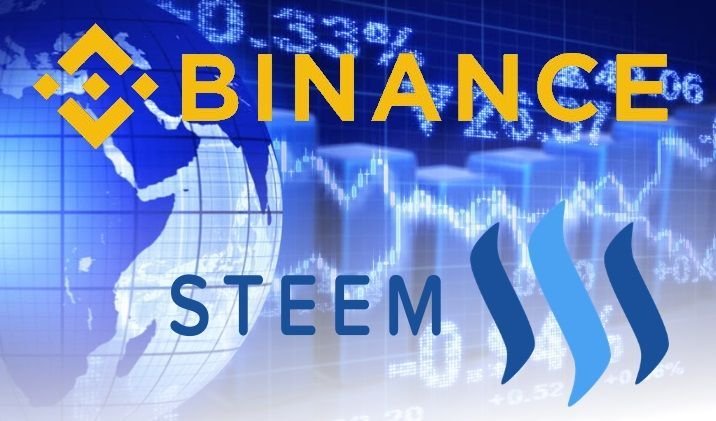
- Binance lists Steem today!
- SEC stops alleged Scam ICO!
- Masternodes - Money through Network Coverage!
- Bitfinex and Tether get Subpoena from US Regulator CFTC!
- Venezuela wants to launch Cryptocurrency Petro in mid-February!
- Bee Token and WeTrust are working on an Alternative to Airbnb!



Today is the day we all have been waiting for, Binance lists Steem on it's exchange.
- STEEM/BNB
- STEEM/BTC
- STEEM/ETH
Now we just have to hope that Binance will also list SBD to there exchange.


The US Securities and Exchanges Commission SEC has suspended an Initial Coin Offerig that is allegedly fraudulent. It is an ICO of the AriseBank from the US state of Texas. Investors who have probably been victims of fraud should contact the SEC.
The US Securities and Exchange Commission (SEC) stopped the ICO from being the self-proclaimed "first decentralized bank in the world". The reason given is that AriseBank and its co-founders Jared Rice Sr. and Stanley Ford have offered and sold unregistered investments. According to the AriseBank have their ICO on social media channels, through public support by prominent personalities and other distribution options have promoted and so have taken a total of about 600 million US dollars of the targeted 1 billion already in a period of two months.
As part of their cryptocurrency token sales AriseCoin, Rice and Ford have made AriseBank the first decentralized bank of their kind to offer their customers a range of banking products using over 700 different currencies. For this an algorithmic trading platform was developed, which carries out automated trades in different crypto currencies.
The SEC also notes that AriseBank has falsely claimed to have bought a deposit-insured bank (FDIC insured), which allows it to insure customers' accounts. In addition, customers were promised a VISA card issued by Arise to spend each of the 700 cryptocurrencies.
The court in charge accepted the requirements of the SEC and set about freezing the affairs of AriseBank and Jared Rice Sr. and Stanley Ford. Thus, the SEC intervened to protect the digital currencies before they could be embezzled. In addition, the SEC asked potential victims of the fraud to contact them and to coordinate further action.


Masternodes are increasingly being considered as a new option for passive income. But why can master-hoster even make money and which masternode systems are available on the market?
The cryptocurrency market offers a variety of ways to make money and is for many the primary reason to look at blockchain-based systems. Investing in mining pools, proof-of-stakes consensus, and finally, master indexes, has become very popular in the search for passive income. But what are mastering reasons and why there should be money for hosting such is not clear to many.
To understand mastering, it helps to first remember what nodes in the Bitcoin ecosystem are: they are the backbone on which the network works, in addition to the miners. Simply put, these are servers that have stored the entire blockchain and verify both transactions and blocks. The decentralization and performance of the network is based on the fact that it is distributed on as many nodes as possible.
Unlike the role of miners, this role is not rewarded in the Bitcoin network. Bitcoin node hoster do their job for their own sake, for security reasons, and to proactively participate in the network.
DASH - Decentralized Governance thanks to Masternodes
However, other cryptocurrencies pay for at least part of the nodes the associated activity: at DASH, operators of a so-called master-node participate in the profits made by the miners. The role of master-nodes in the DASH system is even more important than that of Bitcoin-nodes.
Masternodes, like the nodes known in the Bitcoin system, are responsible for transaction distribution over the network. In addition, it ensures anonymisation and a quasi-instantaneous transaction. The central role that masternodes play in the DASH ecosystem is further enhanced by their role in decentralized governance: individual DASH master nodes decide in an election process the future of the network and how the available budget should be used. For example, outsiders can track this process on DASH central.
Finally, as already written, masternode hosters are remunerated for their work. Currently around 3.6 DASH are generated every two minutes. Of these, 45% go to the masternodes. With currently existing 4,750 masternodes this means that a masternode hoster can earn 120 Euro per day - so a solid middle class salary just by the way!
Co-decision on the future of the network and the prospect of profit are an incentive for many to set up a master's class. However, the dream of a passive income is in the way that masternode hoster must have a deposit of 1,000 DASH, which currently equates to more than 600,000 euros. Surely many readers will not have the capital. However, there are solutions in which a share of a masternode can be bought and you will be paid accordingly lower, but here, after all, 25 DASH, so about 15,000 euros necessary - which is not easily affordable.
It should also be noted here that the investor must leave this initial investment to an external provider. As has been shown in part by cloud mining providers, this trust can be punished.
Cheap to passive income?
But DASH is by no means the only system that works with masternodes and pays the operators money: There are many smaller currencies that require a much lower deposit. In addition to DASH, especially PIVX and Zcoin are well known, but other, much less well-known cryptocurrencies also advertise with masternodes. Masternodes.online lists 94 cryptocurrencies whose ecosystems include master nodes. Six of these coins require an initial investment of less than a thousand euros, Arctic Coin currently expects only 89 euros!
Especially with these cryptocurrencies, the aspect of "passive income" is often in the foreground. Arctic Coin is promoting their project primarily with the money-making aspect, and similar things can be said about much of the smaller cryptocurrencies. How sustainable a source of money, which pursues no further benefit, is actually, is an open question. Here, as with any long-term investment, you should check whether there is an increase in value here. The market capital of such cryptocurrencies is not for nothing very low, so that the risk of pump-and-dump schemes must be considered.
In addition, the initial investment is of course only a variable, if too little revenue is generated in the course of a year, a masternode is not profitable. Therefore, the annual return on investment should always be considered and how long it will take to recoup the money invested - plus the ongoing costs of power and the like. The longer this takes, the safer you have to be that the course does not fall again.
Finally, the emergence of the masternodes, which advertise nothing but passive income, also identifies a problem in the crypotcurrency sector: the aspect of underlying technology and decentralized governance is underplayed by many new investors - the idea is as far as possible to want to make a lot of money.
Nevertheless, it is worthwhile to take a closer look at the smaller cryptocurrencies offered by masternodes, since interesting new use cases can also be developed here.
Similarly, the possibilities of decentralized governance also continue to make masternodes think; For example, Stratis has developed a module that provides a platform for developing masterternodes on Microsoft Azure. The initial investment here is extremely high with 250,000 STRAT (which is almost 3 million euros), so it can be assumed that this is more thought of as masternodes in a blockchain-as-a-service environment. A similar thought also seems to be shared by Jason Cassidy, the co-founder of Blockchain TV, who sees the next step in the service code as a service that will enable businesses to quickly establish blockchains.


Now also a US authority doubts at the complete covering of the dollar Substitute Tether. The consequences of a market failure could be dramatic. Or is it just scare tactics? We explain the background of the latest horror news about the tether dollar.
The subpoena was issued a month ago, but only now with a Bloomberg article in the media. Indeed, on December 6, the Commodity Futures Trading Commission (CFTC) sent a summons to Bitfinex and Tether. The CFTC is an American regulator that oversees the futures and options markets.
Why the two companies have received the summons, is currently unknown. Probably the point is that Bitfinex and Tether have published the so-called "tethers". These are Tokens on the Bitcoin and Ethereum blockchain that represent dollars or Euros. Tether claims that all dollars or euros are present and in a bank account (more about this: the tether labyrinth).
Bitfinex and Tether are closely related, according to Bloomberg. A Bitfinex spokesperson said on December 3 that Jan Ludovicus van der Valde is CEO of both companies, while the leaked Panama Papers revealed that Bitfinex's chief strategy officer Phil Potter is also director of Tether. This fits in nicely with the observation that mass issuance of new tethers started only last year, after Bitfinex had massive problems paying and paying out dollars and replacing most of the dollar transactions with tether transactions. The exact proportion of tethers in the dollar transactions of the stock market is not known.
Bitfinex is only part of the Tether story. Dollars are an uncomfortable chapter for virtually all crypto exchanges, which became even hairier as a result of US tightening regulations last year. Accordingly, some of the largest exchanges in the crypto markets trade dollars exclusively as tethers. These include OKEx, Binance, Huobi, Bittrex, HitBTC, Poloniax and more. With the help of Tether, the exchanges can offer the important dollar currency pairs without taking the trouble to cooperate with a bank. This is of course practical, but it also means that large parts of the ecosystem must trust tether.
Basically, the tether construction behaves in a similar way to the Bretton Woods system: the whole world has trusted that the US government had enough gold in its vaults to preserve the value of the dollar and thus all other currencies. All you have to do at Tether is no government, but a private company that has to hide its bank accounts from the long arm of the US government.
There has long been some doubt as to whether Tether actually fully covers the tokens with dollars. These doubts become more important as more dollar tokens generate tethers. In the past twelve months alone, the number of tether dollars has increased from around 25 million to more than 2.2 billion. Since November 2017, around 1.8 billion tether dollars have been issued, of which almost a billion in January. Thus, Tether printed more dollars this month than the United States of America, which produced "only" $ 540 million.
The emergence of new Tethers. Source: Coinmarketcap.com
Critical observers have long considered that issuing new Tethers regularly precedes a rise in the Bitcoin price, and that, with good regularity, new tether packages go onchain when the price goes down. From this perspective, Tethers are used to manipulate the crypto markets. The whole gigantic boom that we've seen and admired since November is not based on a real demand for cryptocurrencies, but only on the liquidity injected into the markets through an uncovered and unleashed release of Tether.
Everything just the work of Tether? The incredible rally of the last three months has raised the market capitalization of all cryptocurrencies from 180 to almost $ 800 billion for a short time. Source: Coinmarketcap.com
On the other hand, it can be argued that it is a good strategy for the stock markets - and their banks too - to bunker dollars and use tethers to handle day-to-day transactions. The more turbulence in the market, both good and bad, the higher the demand for these dollar tokens. The amount of tether is therefore not cause, but the result of wild market events. The capital to issue tens of billions of billions is likely to hit the stock markets after a hugely successful year in 2017.
The truth is probably only one way to know it: by making an audit of Tether's bank accounts. This is exactly what the accountants of the New York agency Friedmann LLP should do. As of September 2017, the auditors confirmed the balance of Tether according to an internal document, however, it remains questionable whether they could actually check the bank accounts, as Tether has blackened them in the relevant document. However, a final audit, including the tethers produced since then, is not available. The cooperation between Bitfinex / Tether and Friedmann LLP has recently been completed. According to Tether, she is not feasible, because Friedmann "makes a tantalizingly detailed procedure."
So, the Tether story ends up with somewhere that there's a mysterious bank account that's $ 2.2 billion or not, and that we have little more than the word of Tether / Bitfinex that all the tethers through Dollars are covered. In the Bretton Woods system, doubts that the US government had enough gold in its vaults eventually became so strong that it was no longer possible to keep the price of gold on the exchanges in the agreed corridor. Shortly thereafter, the Bretton Woods system unfolded.
At Tether, such doubts seem to be very delicate. Kraken is the only exchange that offers the currency pair US dollar against tether dollar. Here the course fell in the last few days temporarily to 93 cents, but he was able to catch again and now floats around the 99 cent around. That is still reasonably stable.
Tether price at Kraken.
The consequences of the subpoena of US regulator CFTC is currently still difficult to assess. Similarly, it is difficult to predict the consequences that a collapse of the tether system can have on the entire markets. However, with many large crypto exchanges producing dollar liquidity through tethers, there could be devastating chain reactions that affect all crypto markets. But all that is still pure speculation.


The presale of the Venezuelan cryptocurrency Petro is due to begin on February 20th. President Nicolás Maduro presented on Tuesday a White Paper on the functioning of the new cryptocurrency. In view of the economic sanctions of the United States and the lack of foreign exchange, the Venezuelan government wants to regain access to the international financial markets with the Petro.
He then suggested, “All the savings banks in the country can have their mining farms and participate in El Petro.”
Maduro also claimed:
The currency is to be hedged with the huge oil reserves of the South American country. At the beginning, five billion barrels of oil (159 liters each) are reported as safety for the Petro. Overall, the oil-rich country in the world claims to have reserves of 267 billion barrels.
Due to the relatively low price of oil, mismanagement and corruption, Venezuela has suffered for years from a severe economic and supply crisis. Inflation is by far the highest in the world. In addition, the country has hardly any foreign exchange to introduce food, medicines and everyday necessities.


The Blockchain start-ups Bee Token and WeTrust from San Francisco want to work together to create a kind of decentralized Airbnb. For this purpose, information should be exchanged with each other in order to improve customer comfort.
Short-term leasing start-up Bee Token and financial services platform WeTrust are working together to develop "decentralized insurance based on crowdsourcing deposits". The deposits are meant to be a financial buffer for both the hosts listed on Bee Token's Beenest platform and guests.
In order for this project to be implemented, the two startups plan to connect with each other to share information about users, including their overall trust as a tenant or host. The idea behind it is that the two companies can reduce the cost of a breakdown or damage. An insurance against possible damage to property should provide precaution. The companies want to gain access to an overnight accommodation sharing economy.
The CEO of WeTrust George Li said in a statement:
The platform of Bee Token has a token of the same name, which previously contained a presale of ten million US dollars. The public token sale will begin at the end of this month. In a recent interview with the San Francisco Chronicle, Bee Token co-founder Jonathan Chou suggested that the platform should in a way meet those already involved in the world of cryptocurrency.
In case you missed my last news just click here!

I wish you all a great Thursday!!!
ⓁⓄⓥⒺ & ⓁⒾⒼⒽⓉ
Best regards
@danyelk

